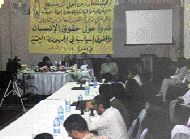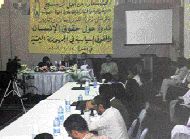
Human and Political Rights in Yemen: A SEMINAR [Archives:2001/05/Law & Diplomacy]
January 29 2001
Imad Al-Saqqaf
Taiz Bureau Chief
Yemen Times

Later on, Dr. Salaheddin Haddash presented a working paper on human and political rights -mainly concerning elections- in Yemen. He mentioned the constitutional articles that grant Yemenis the right to vote in all elections and further stated that internationally approved standards of human and electoral rights are met in the constitution. According to Dr. Haddash, the main obstacle facing the election process in Yemen is illiteracy, as many violations take place through interfering in illiterate electors’ votes during the election process. This in itself is an obvious human rights violation that should be stopped. Dr. Haddash concluded his statement by presenting steps that could help avoid future problems in the election process:
– Forming an independent and honest Judicial Court to deal with election violations and end any disputes over voting problems
– Providing equal coverage by government-run media organs during and before the election period for the parties participating in the elections.
– Not using governmental resources, including funds and other assets, in favor of the ruling party over all the other competing parties.
– Supervising and correcting candidate and electoral lists on a regular basis.
– Encouraging women to participate in the electoral process.
– Preventing and avoiding the use of violence during the elections.
Afterwards, female lawyer Nabile Al-Mufti presented a working paper about human rights and the political right of forming parties and groups in Yemen. In her paper, she stated that the Yemeni law that organizes political parties and movements, grants Yemenis the right to form political parties and groups on condition that they do not contradict Islamic values, Yemen’s unity and independence, the republican system, the revolution and constitution’s objectives, the national and Islamic values of Yemenis and the universal declaration of human rights. She also mentioned other conditions for forming a political party, including not setting up any sort of military structure, plus other conditions. She also mentioned that the law gave the judicial system the exclusive right to stop or suspend any political party. Hence, it would be impossible for any authority or governmental office to order the closure or suspension of any party without a decisive verdict from a court, which must first have received a written request from the Head of the Party Affairs Committee.
Ms. Nabile concluded her statement by mentioning the obstacles facing political and civil freedom in Yemen, and the NGO law recently endorsed by parliament.
Dr. Abbas Al-Junaid also presented a working paper on human rights and freedom of expression in Yemen. In his paper, he emphasized that freedom of expression is a human right which does not distinguish between male and female. He also stated that freedom of expression in Yemen is guaranteed in the written press and can be easily observed in the various newspapers that represent different parties and viewpoints, and could also be observed in the different political parties and groups which all operate without government interference.
The Chairman of the Yemeni Civil Forum, Lawyer Jamal Al-Adimi’s working paper focused on human rights and peaceful forums in Yemen. He explained that Yemeni laws and the constitution respect and organize peaceful civil movements in Yemen. He also stated that parliamentary and local elections are the two practical developments that would show to what extent did Yemen reach in terms of internationally accepted standards in human and political rights.
After all the working papers were presented, a discussion session was held, in which many intellectuals and professors from Taiz University debated the reasons behind the low participation of Yemeni women in elections, and their absence from political life. The seminar concluded that there should be more intensive efforts to spread awareness among the female population of the important role women should play in future elections.
Among the participants in the seminar were Yusuf Abu Ras, Manager of the UN Information Center in Yemen, Suzan Darlin of Helsinki University , Finland, Abdulamalik Al-Marhabi, Representative of the Friedrick Stiftung office in Yemen, and Faiza Abdulraqib, Deputy Manager of the Arab Institute for Developing Democracy in Aden.
——
[archive-e:05-v:2001-y:2001-d:2001-01-29-p:./2001/iss05/l&d.htm]


